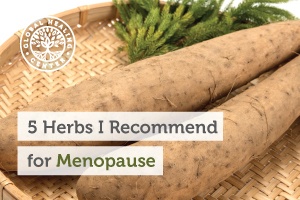
Menopause can be a trying time for women. It affects day to day activities, mental clarity, and mood. In previous articles, I have discussed the basics of menopause and have also included some natural suggestions for dealing with its most common symptoms. Most women may find relief from annoying menopause symptoms using herbs as these tools typically provide a limited number of side effects compared with hormone replacement therapy (HRT). Here are five of the most effective herbs for menopause.
Effective Herbs for Menopause
1. Black Cohosh
The use of Black cohosh for easing menopause symptoms is nothing new. For centuries, women have sworn by the herb as a powerful tool for alleviating hot flashes. Fortunately for us, science has come forth to validate this centuries-long use. One clinical review of thirty-two studies confirmed that, while the mechanism remains unclear, Black cohosh can effectively reduce hot flash occurrence, intensity, and duration. [1] Some researchers believe that the herb acts as an estrogen modulator, with other theories stating that the compounds within Black cohosh affect the dopaminergic system.
2. Wild Yam
Wild yam, also known by its Latin name Dioscorea villosa, should not be confused with the yams that you might have in your kitchen. The wild yam is a different species known for its active ingredient diosgenin, which is a phytoestrogen. Diosgenin contains an ingredient similar to DHEA, a precursor to human sex hormones. [2]
An East Indian traditional herb, wild yam has a long history of use for hormonal concerns. Many menopausal women will use creams containing wild yam; however, research is inconclusive as to whether or not the topical application provides any noticeable benefit. [3] Typically, only the roots are used when preparing creams, tinctures, and extracts.
3. Skullcap
Two of the most serious concerns for women going through menopause are mood swings and depression. Several herbs may help, but American skullcap (Scutellaria lateriflora) may be one of the best. Skullcap is specifically noted in some research to support a calm state of mind. [4] Further research is certainly needed to determine skullcap’s direct effect on mood in menopausal women.
4. Ginseng
Ginseng may be the best general-purpose herb for menopause. It's often called by its full botanical name Panax ginseng, but is often referred to as Red ginseng and Asian, Chinese, Siberian, or Korean ginseng. Its primary menopausal benefit is its ability to support vitality and ease stress. [5] Women entering menopause will often feel physically low because some symptoms, such as hot flashes, zap energy. Sleep is often interrupted as a result of menopause, especially thanks to hot flashes. Ginseng may come to the rescue on this front, possibly supporting healthy sleep cycles by aiding relaxation.
5. Red Clover
Red clover, Trifolium pratense, is a common variety of clover with reddish flowers. It has several uses, but many menopausal women suffering from hot flashes find that it's effective for providing some level of relief. [6] The flowers contain isoflavones which mimic estrogen in the body. This action may help lower the incidence and intensity of hot flashes; however, evidence on this subject remains inconclusive. [7]
Encouraging Hormonal Balance
Imbalances in hormonal activity, in either direction, are common during menopause. There are a number of natural remedies for promoting hormonal balance; methods that aren't invasive at all, like exercise and stress reduction. Additionally, there are a number of herbs, such as ashwagandha and Tribulus terrestris, that promote hormonal balance. For an easy supplement solution, I recommend Women's Hormone Balance. I recently had a webinar on promoting hormonal balance that's also covers this topic in depth. If you click the link you can watch the video recording for free.
References (7)
- Kanadys WM, Leszczynska-Gorzelak B, Oleszcuk J. Efficacy and safety of Black cohosh (Actaea/Cimicifuga racemosa) in the treatment of vasomotor symptoms--review of clinical trials. Ginekol Pol. 2008 April;79(4):287-96.
- Wu WH, Liu LY, Chung CJ, Jou HJ, Wang TA. Estrogenic effect of yam ingestion in healthy postmenopausal women. The Journal of the American College of Nutrition. 2005 August;24(4):235-43.
- Komesaroff PA, Black CV, Cable V, Sudhir K. Effects of wild yam extract on menopausal symptoms, lipids and sex hormones in healthy menopausal women. Climacteric. 2001 June;4(2):144-50.
- Wolfson P, Hoffmann DL. An investigation into the efficacy of Scutellaria lateriflora in healthy volunteers. Alternative Therapies in Health and Medicine. 2003 March-April;9(2):74-8.
- Kim SY, Seo SK, Choi YM, Jeon YE, Lim KJ, Cho S, Choi YS, Lee BS. Effects of red ginseng supplementation on menopausal symptoms and cardiovascular risk factors in postmenopausal women: a double-blind randomized controlled trial. Menopause. 2012 April;19(4):461-6. doi: 10.1097/gme.0b013e3182325e4b.
- van de Weijer PH, Barentsen R. Isoflavones from red clover (Promensil) significantly reduce menopausal hot flush symptoms compared with placebo. Maturitas. 2002 July 25;42(3):187-93.
- Baber RJ, Templeman C, Morton T, Kelly GE, West L. Randomized placebo-controlled trial of an isoflavone supplement and menopausal symptoms in women. Climacteric. 1999 June;2(2):85-92.
†Results may vary. Information and statements made are for education purposes and are not intended to replace the advice of your doctor. If you have a severe medical condition or health concern, see your physician.



